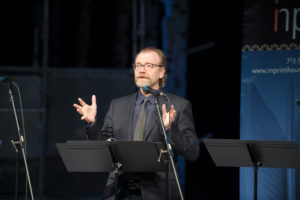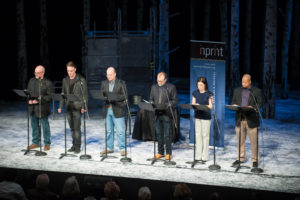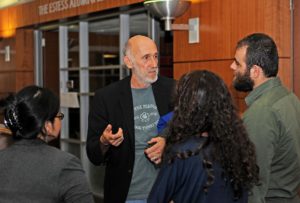 At Wednesday’s reading, Jeffrey Eugenides said he was genuinely surprised that he wrote a book that at all contained Jane Austen or George Eliot or the Victorians at all. Eugenides said that at Brown in the ‘80s, he was enamored with the modernists—Joyce, Proust, Faulkner—anyone or anything that was “taking apart consciousness.” But then, he said, he graduated and read Tolstoy (which exemplifies the kind of writing the modernists were reacting to) and discovered the “narrative drive and vividness of characters so compelling that they shouldn’t be left behind in the drive toward something new.” Thus, The Marriage Plot, in which deconstruction and tradition both have their place.
At Wednesday’s reading, Jeffrey Eugenides said he was genuinely surprised that he wrote a book that at all contained Jane Austen or George Eliot or the Victorians at all. Eugenides said that at Brown in the ‘80s, he was enamored with the modernists—Joyce, Proust, Faulkner—anyone or anything that was “taking apart consciousness.” But then, he said, he graduated and read Tolstoy (which exemplifies the kind of writing the modernists were reacting to) and discovered the “narrative drive and vividness of characters so compelling that they shouldn’t be left behind in the drive toward something new.” Thus, The Marriage Plot, in which deconstruction and tradition both have their place.
What Eugenides said in the post-reading interview with Alex Parsons really put the book in an articulate perspective for me. He said in writing this book he was interested in the moments in our lives when “our head and our heart are in conflict.” The head, in this case, is the sense-making deconstruction of Barthes and Derrida, the necessary acknowledgement that everything, even love, is a construct. The heart, then, is the passion Madeleine feels for Leonard, the dependence on the purity of feeling for truth. Of course, Leonard, a scientist with manic depression, is constantly negotiating head troubles and heart troubles. And Mitchell, a gifted philosopher in pursuit of religious purpose, is also grappling with head and heart, the known and the unknown.
Though many have criticized this novel for not being as epic in scope as Middlesex or as narratively risky as The Virgin Suicides, Eugenides’s comments on Wednesday gave words to why this book is still successful. In short, because it’s about—as many great novels are—the things that linger over our real selves for years and years after they take seed and ruin our graduation, or our trip across Europe, or our first love.
On Wednesday, Eugenides gave a bit of advice for first-time novelists: give yourself limitations. Don’t try to write the whole world your first time out. Sounds like excellent advice to me, but in a recent post over at
The Millions, Eugenides articulates a slightly different lesson. He discussed why and how he sat down to write this novel, and tried to name what he learned from all of it. His lesson is the lesson I want to remember when I sit down to write mine:
But you don’t write a novel from an idea, or at least I don’t. You write a novel out of the emotional and psychological stuff that you can’t shake off, or don’t want to. For me, this had to do with memories with being young, bookish, concupiscent, and confused. Safely in my 40s, married and a father, I could look back on the terrifying ecstasy of college love, and try to re-live it, at a safe distance. It was deep winter in Chicago when all this happened. Every day I looked out my office window at snow swirling over Lake Michigan. After separating the two books, I put one in a drawer and kept the other on my desk. I ran off with The Marriage Plot and didn’t look back. I changed completely, became a different person, a different writer; I started a new life with a new love, and all without ever leaving home.
 On March 6th, George Saunders made his third appearance with the Inprint Margarett Root Brown Reading Series, in order to celebrate a first—his only novel, Lincoln in the Bardo, just debuted #1 on the New York Times Bestseller list.
On March 6th, George Saunders made his third appearance with the Inprint Margarett Root Brown Reading Series, in order to celebrate a first—his only novel, Lincoln in the Bardo, just debuted #1 on the New York Times Bestseller list. Novelist and Director of the University of Houston Creative Writing Program Alex Parsons interviewed Saunders, whose humane wit set the tone for the evening. “We’re just a couple of guys in the forest at night,” he said, settling into a chair wedged between the scenery. Continue reading
Novelist and Director of the University of Houston Creative Writing Program Alex Parsons interviewed Saunders, whose humane wit set the tone for the evening. “We’re just a couple of guys in the forest at night,” he said, settling into a chair wedged between the scenery. Continue reading 

 I asked several local literary tastemakers for their recommendations of spooky stories and haunting poems, inspired by this month’s Halloween celebration. After all, is there really a way to know that the person in the Ken Bone costume at your next party is not the man himself?
I asked several local literary tastemakers for their recommendations of spooky stories and haunting poems, inspired by this month’s Halloween celebration. After all, is there really a way to know that the person in the Ken Bone costume at your next party is not the man himself? On August 24th, the UH Creative Writing Program started things off for the Fall 2016 semester by allowing long time chair, J. Kastely, to quit his job.
On August 24th, the UH Creative Writing Program started things off for the Fall 2016 semester by allowing long time chair, J. Kastely, to quit his job.